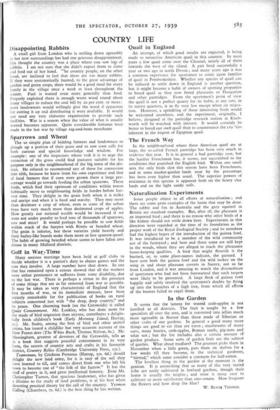Golf in War-Time
Many anxious meetings have been held at golf clubs to decide whether it is a patriot's duty to abjure games and the cost they involve. A large number have shut down. In one that has remained open a census showed that all the workers were either pensioners or sufferers from some disability, due to the last war. There is perhaps a virtue in the presence of some things that are as far removed from war as possible. It may be taken as very characteristic of England that the first months of war, or its immediate menace, have been entirely remarkable for the publication of books on rural subjects concerned just with " the deep, deep country," and its peace. One charming book (on the Cotswolds) is called Quiet Contentment. Mr. Lockley, who has done more for the study of bird migration than anyone, contributes a delight- fully fresh children's book (Early Morning Island, Harrap, 5s.). Mr. Seaby, among the best of bird and other animal artists, has issued a childlike but very accurate account of the New Forest deer (The White Buck, Thomas Nelson, 6s.). Mr. Massingham, greatest of devotees of the Cotswolds, tells us in a book that suggests peaceful contentment in its very form, the secrets of country arts and crafts in his favourite district, Country Relics (Cambridge University Press, r 5s.).
Teamsman, by Crichton Porteous (Harrap, ios. 6d.) should delight the new land army, for it is racy of the soil they have learned to till, and comes direct from one who left his town to become one of "the folk of the furrow." It has the stuff of poetry in it, and great intellectual honesty. Even Mr. Christopher Tumor, that spacious landowner, who has given a lifetime to the study of land problems, is at his best when deserting practical theory for the call of the country. Yeomen Calling (Chambers, 7s. 6d.) is the best thing he has written.








































 Previous page
Previous page